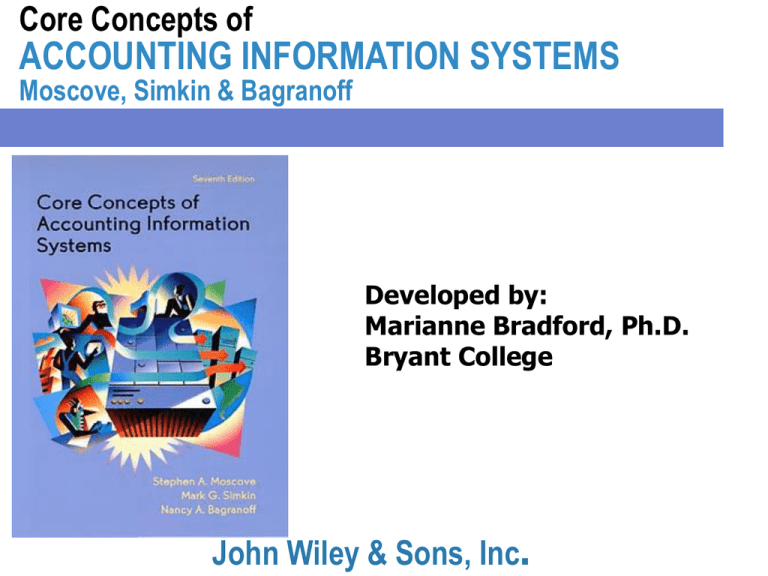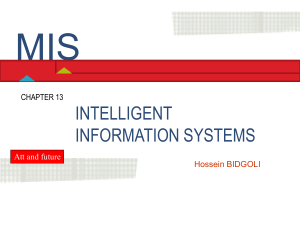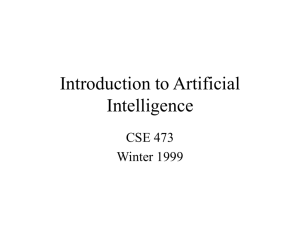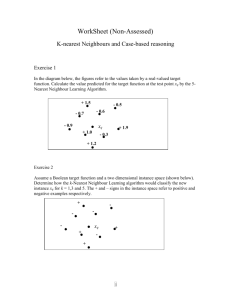
Core Concepts of
ACCOUNTING INFORMATION SYSTEMS
Moscove, Simkin & Bagranoff
Developed by:
Marianne Bradford, Ph.D.
Bryant College
John Wiley & Sons, Inc.
Chapter 14
Information and Knowledge
Processing Systems in Accounting
• Introduction
• Information and Knowledge Processing
• Information Processing Systems in
Accounting
• Solving Accounting Problems
with Artificial Intelligence
• Comparing Information and
Knowledge Processing Systems
Introduction
• Accounting systems have evolved from systems that
primarily process transaction data to systems that
process information and impart knowledge.
• Transaction processing systems are often incapable
of helping managers in their planning
functions.
• This chapter discusses different
types of evolving accounting systems
and provides a comparison of
characteristics and problem domains.
Information and Knowledge
Processing
• One of the earliest applications of
computerized processing was transaction
processing.
• Transaction processing involves processing
data in volume, and it usually requires
computers to do simple, repetitive tasks.
• These systems do not lend themselves to the
types of analyses required for upper-level
management decisions.
Information and Knowledge
Processing
• Advances in information technology
allow managers to develop complex
processing systems that use information
as a competitive tool.
• It is important to understand the various
information and knowledge processing
systems available to help accountants and
managers in their work.
Strategic, Management Planning,
and Operational Decision Making
• Top management makes strategic decisions, which
involve long-range planning horizons and
commitments of large amounts of resources.
• Middle management makes management planning
decisions, which involve translating a company’s
long-range plans into specific plans and activities.
• Operating management makes
operational decisions, which operationalize
management planning decisions
into specific, meaningful tasks.
Types of Processing Systems
• Transaction Processing involves converting
transaction data into useful information.
• Management Information Systems involve
processing nonroutine data and information for
management planning and control.
• Knowledge Processing is the highest level of
processing and is made possible by recent
advancements in technology.
Information Processing
Systems in Accounting
•
•
•
•
Decision Support Systems
Spreadsheets
Executive Information Systems
Group Support Systems
Decision Support Systems
• Decision support systems (DSS) are
information processing systems that assist in
the decision-making process of professionals.
• Characteristics of DSSs:
– Support management decisionmaking
– Solve unstructured problems
– Allow for “what-if” questions
– Flexible and handle many
different problems
– User-friendly interface
Components of Decision
Support Systems
• The user - usually manager
• One or more databases - contain routine
and nonroutine data from external and
internal sources
• A planning language - performs the
communication function
• The model base - performs data
manipulations and computations on data
Examples of DSS in Accounting
•
•
•
•
A Cost Accounting System
A Capital Budgeting System
A Budget Variance Analysis System
A General Decision Support
System
Spreadsheet Programs
• Using spreadsheet software, a user can
quickly develop a spreadsheet model to
support decision-making.
• Examples:
– Excel
– Lotus 123
– Quattro Pro
Other Information
Processing Systems
• Executive information systems (EIS)
provide support for strategic decisions
made by an organization’s top
management.
– The Internet is becoming an important
source of external data in EISs.
• Group decision support systems are
DSSs developed for use by
management groups or teams.
Solving Accounting Problems
with Artificial Intelligence
• Artificial intelligence (AI) is the branch of
computer science that concerns itself with
computer “thinking.”
– Computers replace humans in doing certain
tasks.
• Expert systems is the branch of AI that
accomplishes decision making or problem
solving and has the most application to
accounting.
Expert Systems
• The AI software most used today in businesses
for accounting applications is expert systems.
• Expert systems are software programs that
uses facts, knowledge, and reasoning
techniques to solve problems that typically
require human abilities.
Characteristics of Expert Systems
•
•
•
•
•
Make expert decisions
Reason by inference
Explain the reasoning process
Learn
Allow for uncertainty
Components of Expert Systems
1. The people who interact with an expert
system - include user, expert and
knowledge engineer.
The knowledge engineer mines the
knowledge of domain experts.
2. The domain database contains all of the
facts about a particular domain or
subject.
Components of Expert Systems
3. The knowledge database contains
procedural knowledge or rules that
dictate which actions to follow.
4. The inference engine “drives” the
expert system by deciding when to
apply rules and the order in which to
apply them.
5. The user interface
Examples of Expert Systems
in Accounting
•
•
•
•
•
•
Risk Assessment Systems
Technical Support Systems
Internal Audit Subsystems
A Tax Preparation System
A Tax Planning System
Expert Systems at the Internal
Revenue System
Benefits of Expert Systems
•
•
•
•
Consistent application of rules
Easy to modify by adding and deleting rules
Incorporates knowledge of many experts
Retention of expert knowledge when employed
experts leave an organization
• Capable of training novices
• Efficient because can be used over and over by
inexperienced users
Risks and Limitations of
Expert Systems
• Legal liability of system developers
• Less than expert performance without
validation
• Can be expensive to develop and maintain
• Consensus among experts sometimes difficult
to obtain, making development also difficult
• Lack common sense and ability to think
critically
• Staff members using expert systems will fail to
develop expert knowledge
Neural Networks
• Neural networks solve problems by
learning from experience, by observing
patterns in data, and then by using this
learning for prediction purposes.
• System developers train neural
networks with sample data, rather
than programming them.
Case-Based Reasoning Systems
• Case-based reasoning systems reason by
analogy.
• Suitable for problems that require
humans to search through historical data
to find similar problems with successful
solutions.
• One application of case-based reasoning
systems is fraud detection.
Advantages of Case-Based
Reasoning Systems
• Systems developers do not require expert
problem understanding to build casebased reasoning systems.
• They have a learning capacity.
• They have the ability to incorporate
explanations in their database
to accompany solutions
Intelligent Agents
• Intelligent agents are artificial intelligencebased information systems that act on behalf of
a user.
• Tasks performed by intelligent agents:
– Prioritizing information
– Locating and retrieving information from databases
• Search engines are a type of intelligent agent.
Search Engines
• The Internet has spurred the need for agents
(search engines) to perform information
retrieval and filtering.
• Bots are a type of intelligent agent that derives
their name from the robotic branch of artificial
intelligence.
• Spiders crawl the web in search of data.
• Intelligent agents have value to accountants in
the form of data mining.
Comparing Information and
Knowledge Processing Systems
Characteristics
Decision-making
Processing
Problem Type
Learning
Explanation
Capability
Decision
Support
Systems
Support, do
not make,
decisions
Process
quantifiable
information
Rule-Based
Neural
Expert
Networks
Systems
Make decisions Make
decisions
Case-Based
Intelligent
Reasoning
Agents
Systems
Make decisions Make decisions
Process
numeric and
symbolic
knowledge
Unstructured Structured
problems;
problems with
precedence
precedence
not required
(stable)
No learning
No learning
capability
capability
Process
numeric
knowledge
Process
symbolic
knowledge
Process
symbolic
knowledge
Structured
problems with
precedence
(stable)
Learn from
mistakes
Structured
problems with
precedence
(dynamic)
Learn from
mistakes
Structured
problems with
precedence
No
explanation
capability
No
explanation
capability
Can explain
how and why
of decisions
No explanation
capabilities
Can explain
how and why
of decisions
Learn from
mistakes
Copyright
Copyright 2001 John Wiley & Sons, Inc. All rights reserved.
Reproduction or translation of this work beyond that permitted in
Section 117 of the 1976 United States Copyright Act without the
express written permission of the copyright owner is unlawful.
Request for further information should be addressed to the
Permissions Department, John Wiley & Sons, Inc. The purchaser may
make backup copies for his/her own use only and not for distribution
or resale. The Publisher assumes no responsibility for errors,
omissions, or damages, caused by the use of these programs or from
the use of the information contained herein.
Chapter 14








